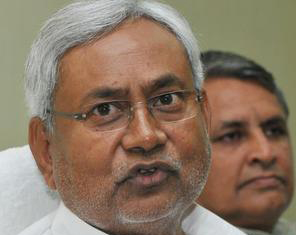 Patna, Jun 19: After dumping ally BJP, Bihar Chief Minister Nitish Kumar on Wednesday comfortably won a vote of confidence in the Bihar Assembly.
Patna, Jun 19: After dumping ally BJP, Bihar Chief Minister Nitish Kumar on Wednesday comfortably won a vote of confidence in the Bihar Assembly.
A total of 126 votes, including four of the Congress and one of the CPI, were cast in favour of the confidence motion while 24, including 22 of Lalu Prasad-led RJD, voted against the motion as the BJP members staged a walkout before the vote.
Those who voted in favour of the motion included ruling JD(U)’s 117 and four Independents. Besides RJD’s 22 MLAs, two Independents also opposed the motion.
Significantly, the Congress support for the government comes two days after Prime Minister Manmohan Singh described Kumar as secular and indicated that his party could do business with the RJD. The Central government had already enhanced development assistance to Bihar as a backward state recently, setting off speculation that the two parties could come together in future elections.
In his speech in the Assembly, Mr. Kumar said, without taking the name of Narendra Modi, that the main reason for breaking the alliance with BJP was the elevation of the Gujarat Chief Minister in his party.
He said the slogan shouting by BJP MLAs hailing Mr. Modi went to buttress JD(U)’s point, an apparent reference to the possibility of the BJP making him the Prime Ministerial candidate.
Later, the Chief Minister in a chat with reporters thanked the Congress party for voting in favour of the trust motion.
“But if you think that there was some discussion (between JD(U) and Congress) about future, there has been no discussion,” he said.
"We know you have mustered majority in the House to ensure passage of trust vote...therefore we are walking out," BJP legislature party leader Nandkishore Yadav announced in the House.
On Yadav's announcement, BJP MLAs promptly walked out of the legislative assembly while the debate on the trust vote moved by the Nitish Kumar government was going on.
Yadav accused the Chief Minister of betraying the mandate of the people and said the electorate will teach a lesson to the JD(U) in the next general elections and the 2015 assembly polls.
"The next general elections and the subsequent assembly polls are not too far away in which the people of Bihar will teach a lesson to you (Chief Minister and his party)," the senior BJP leader said.
Apparently seeking to woo away votes of other political parties from the JD(U), Yadav said the Chief Minister was responsible for scrapping the MLA/MLC local area development fund after re-election to power in 2010.
"I had opposed your decision to scrap the local area development funds of the Bihar lawmakers...but you convinced me to go with your decision," he said.
"Do you think that the lawmakers are thieves?" he asked the Chief Minister.
After sacking 11 BJP ministers from his Cabinet, Kumar had met Governor D Y Patil on Sunday and requested him to call a special session of the Assembly to seek trust vote on the floor of the House.
Going by the numbers, the Nitish Kumar government faces no threat as it has the required strength. In the 243-member House, JD(U) has 118 members, including Speaker, BJP 91, RJD 22, Congress 4, LJP and CPI one each and Independents 6.
JD(U) needs support of four more MLAs to reach the magic figure of 122.It has already got support of four Independents.
Lone LJP member Zakir Hussain Khan has also voiced his support to Nitish Kumar in the event of voting as he did not want to be seen with "communal BJP".





Comments
Add new comment